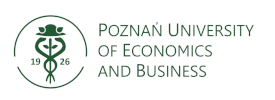
Customer relationship management in international business
Syllabus
Basic information
Field of study*
International Economic Relations
Specialisation
International Business
Department
UEP
Level of qualification
Second-cycle programme
Mode of study
Full-time
Track
General academic
Didactic cycle
2020/2021
Subject code
UEPMSG03S.28C.11372.20
Language of instruction
English
Mandatory
Obligatory
Block
Block C
|
Period
Semester 4
|
Method of evaluation
Assessment
Activities and hours
|
Number of ECTS points
3
|
Subject’s educational aims
| C1 | To comprehend the interrelated potential of CRM strategy, systems & change management |
| C2 | To learn about the implementation issues of CRM |
| C3 | To discover the internal and external barriers of CRM implementation in an organization |
| C4 | To get familiar with the CRM processes |
Subject's learning outcomes
| Code | Outcomes in terms of | Effects | Examination methods |
| Knowledge | |||
| W1 | Student is able to characterize interdependencies between relationship strategy, CRM systems and change management. | K2_W01 | Group project / Group work |
| W2 | Student is able to describe the role of value creating processes | K2_W01 | Group project / Group work |
| W3 | Student is able to evaluate the benefits of CRM implementation for an international organization | K2_W01, K2_W02 | Group project / Group work |
| W4 | Student is able to uncover typical problems in CRM implementation in multinational companies | K2_W01, K2_W02 | Group project / Group work |
| Skills | |||
| U1 | Student is able to position CRM in global strategy, business units strategy and functional strategy of an enterprise | K2_U02 | Group project / Group work |
| U2 | Student is able to choose goals of CRM implementation for a multinational company | K2_U02, K2_U05 | Group project / Group work |
| U3 | Student is capable for planning CRM implementation in multinational company | K2_U02, K2_U05, K2_U15 | Group project / Group work |
| Social competences | |||
| K1 | Student is able to asses properly the importance of communication in international customer servicing processes | K2_U17, K2_U18 | Group project / Group work |
| K2 | Student recognizes the interdependence between three stakeholders of a company: customers, employees and owners | K2_K03, K2_K04 | Group project / Group work |
Study content
| No. | Course content | Subject's educational goals | Subject's learning outcomes |
| 1. | The idea of CRM and the relationship maturity of a company | C1 | W1, U1, K2 |
| 2. | Planning CRM implementation | C1 | W1, U1, K2 |
| 3. | Value creating processes, Lead Management, Cross- / Up-Selling. Loyalty Management, Anti-churn Management | C1, C4 | W1, W2, K1 |
| 4. | CRM processes' re-design | C1, C4 | W1, W2, K2 |
| 5. | Global CRM strategy | C1, C2, C4 | W1, W2, W3, W4, U2, K1 |
| 6. | The measurable benefits of CRM | C1 | W3, K2 |
| 7. | External barriers of CRM implementation | C1, C3 | W4 |
| 8. | Internal barriers of CRM implementation | C1, C3 | W4, K1 |
| 9. | CRM field implementation projects | C2, C4 | W2, W3, W4, U2, U3, K1 |
| 10. | CRM systems | C2 | W2, W3, W4, U2, U3, K1 |
Bibliography
Obligatory- Baran R.J., Galka R.J., 2013, CRM, The Foundation of Contemporary Marketing Strategy, Routledge, New York.
- Payne A, Frow P., 2013, Strategic Customer Management, Integrating Relationship Marketing and CRM, Cambridge University Press, Cambridge.
- Gentle M., CRM Project Management Handbook – Building realistic expectations and managing risk, Kogan Page, London 2004
- Greenberg P., CRM at Speed of Light, Third Edition, Essential Customer Strategies for the 21st Century, McGraw-Hill/Osborne, New York, Chicago, San Francisco, Lisbon, London, Madrid, Mexico City, Milan, New Delhi, San Juan, Seoul, Singapore, Sydney, Toronto 2004
Course advanced
Teaching methods:
Project method, Brainstorming, Conversation lecture, Lecture with multimedia presentation, Discussion, e-learning methods
| Teaching methods | Method of evaluation | Credit conditions |
|---|---|---|
| Lectures | Group project / Group work | Students are asked to follow the topics presented during the lectures and to step wise prepare a team project (recommended). Alternatively, there is an exam for the students, who did not participate in a project team. |
Calculation of ECTS points
| Activity form | Activity hours* | |
| Participation in lectures | 30 | |
| Project preparation | 24 | |
| Data collection | 24 | |
| Student workload |
Hours
78
|
ECTS
3.0
|
| Workload involving teacher |
Hours
30
|
ECTS
1.0
|
| Practical workload |
Hours
24
|
ECTS
0.5
|
* one hour of classes = 45 minutes